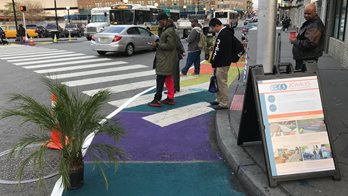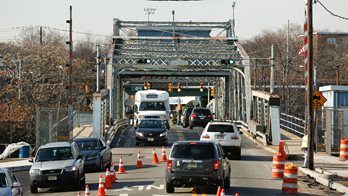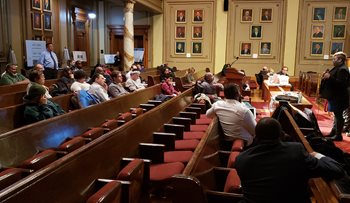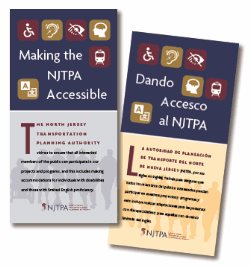Title VI - Civil Rights

Non-Discrimination Policy
The NJTPA conducts its programs, services and activities in compliance with Title VI of the 1964 Civil Rights Act and other federal non-discrimination policies and statutes, as required as a recipient of federal funds. This policy prohibits discrimination on the basis of race, color, religion, sex or national origin.
The NJTPA’s Title VI Assurance for FY 2022. Click here to download the document.
The NJTPA Board of Trustees adopted the Title VI Implementation Plan in September 2019 and updated it January 11, 2021. Click here to download the plan.
Any person or class who believe they have been subjected to discrimination or retaliation under Title VI has the right to file a formal complaint. Complaints shall be filed by completing and submitting the NJTPA's designated Title VI Non-Discrimination Complaint Form. Complaints can also be submitted without the complaint form, as long as the information required by the form is included in the complaint, including the complainant’s name, mailing address, name of agency or department that discriminated, a description of the discrimination, identification  of witnesses. Complaints can be e-mailed to [email protected]. The complaint can also be mailed to the Title VI Coordinator, North Jersey Transportation Planning Authority, One Newark Center, 17th Floor, Newark, NJ 07102 or faxed to the Title VI Coordinator, NJTPA, at (973) 639-1953. Please note “Title VI Complaint” in the subject line of the e-mail or letter.
of witnesses. Complaints can be e-mailed to [email protected]. The complaint can also be mailed to the Title VI Coordinator, North Jersey Transportation Planning Authority, One Newark Center, 17th Floor, Newark, NJ 07102 or faxed to the Title VI Coordinator, NJTPA, at (973) 639-1953. Please note “Title VI Complaint” in the subject line of the e-mail or letter.
Environmental Justice
 The NJTPA also conducts Environmental Justice reviews, which aim to identify and address any adverse effects proposed projects or programs may have on minority and low-income populations to ensure the fair distribution of transportation benefits and burdens among all people. Under federal regulations pertaining to Environmental Justice, a Metropolitan Planning Organization (like the NJTPA) ensures that its Long Range Transportation Plan and Transportation Improvement Plan are consistent with Title VI of the 1964 Civil Rights Act, identifies and assesses the transportation needs of low-income and minority populations, and acts to improve public involvement processes to eliminate participation barriers for low-income and minority persons. Click here to visit the Environmental Justice page to learn more about how the NJTPA integrates this process into its work.
The NJTPA also conducts Environmental Justice reviews, which aim to identify and address any adverse effects proposed projects or programs may have on minority and low-income populations to ensure the fair distribution of transportation benefits and burdens among all people. Under federal regulations pertaining to Environmental Justice, a Metropolitan Planning Organization (like the NJTPA) ensures that its Long Range Transportation Plan and Transportation Improvement Plan are consistent with Title VI of the 1964 Civil Rights Act, identifies and assesses the transportation needs of low-income and minority populations, and acts to improve public involvement processes to eliminate participation barriers for low-income and minority persons. Click here to visit the Environmental Justice page to learn more about how the NJTPA integrates this process into its work.
Equity Resources
The NJTPA is committed to serving the region’s diverse population. Equity must be a robust part of all NJTPA-led and funded planning work. To accomplish this, the NJTPA and its subregions must recognize the populations in the region, and within each study area, that are or have traditionally been underrepresented in the planning process and ensure that their needs are identified and equitably addressed.
The NJTPA has created an Equity Resources website to provide data and guidance. This includes an Equity Analysis Tool, which displays the spatial distribution populations who have been identified as protected under federal regulations and the NJTPA's Equity Assessment Guide, which provides instructions for identifying traditionally underserved populations. Identifying these communities enables planners and engineers to tailor studies to engage these populations and to create recommendations equitable to all members of the community and region. The tool and guide should be used in planning studies conducted by the NJTPA and its subregions.
Click here to visit the Equity Resources website.
Public Engagement
The NJTPA is committed to involving the public in all of its programs, projects and plans. The NJTPA Board of Trustees adopted the agency’s updated Public Engagement Plan in November 2018. The plan discusses all of the ways the NJTPA promotes public participation, including strategies aimed at better including under-represented populations in the decision-making process. As part of ongoing efforts to improve outreach in the NJTPA has published diversity profiles for each of the 15 subregions to inform public and stakeholder engagement.
The NJTPA also conducts formal public comment periods prior to the adoption of certain key planning documents in accordance with federal regulations. This includes the Regional Transportation Plan, the Transportation Improvement Program, the State Transportation Improvement Program and the Air Quality Conformity Determination document. Visit the Public Comment page for information on open comment periods.
Accommodations, Translations, Language Assistance
|
To request assistance in accessing information or attending an event:
Call 973-639-8400 (9:00 a.m. to 5:00 p.m. weekdays)
Email: tritter@njtpa.org
|
As stated in the Public Engagement Plan, the NJTPA seeks to ensure all interested members of the public are able to participate in transportation planning decisions. Any person interested in attending an NJTPA hosted or sponsored event, or accessing information from the NJTPA and any NJTPA-sponsored program or organization, can expect the following accommodations to be made to the extent that resources allow. Requests can be made to the number/email at right. An English brochure and Spanish brochure summarize the following guidelines:
following accommodations to be made to the extent that resources allow. Requests can be made to the number/email at right. An English brochure and Spanish brochure summarize the following guidelines:
-
Materials developed to inform the public about NJTPA activities and work products, such as presentations, posters, and pamphlets, include easy to understand language and visualization techniques.
-
Events are held in venues that are accessible and comfortable for individuals with disabilities. Attendees can request additional assistance or accommodation by contacting the NJTPA at least 7 business days in advance of the event.
-
As location permits, events are held in venues that are reachable via public transportation. Board of Trustees and committee meetings are generally held at the NJTPA’s offices in downtown Newark near Penn Station, a major transit hub that provides bus, light rail, and train service.
-
Individuals may submit comments via a recording or staff transcription of their spoken remarks either before, during or after an event. The NJTPA also accepts comments by phone and e-mail through the contacts listed above.
-
Upon request, accommodations may be made for the hearing impaired. Requests should be made at least 7 business days prior to the event.
-
Electronic content that is made available to the public through the NJTPA website conforms to Section 508 standards which enhance the ability of individuals with disabilities to access and use information. We also use the ReciteMe accessibility tool, which allows visitors to customize the appearance of our site, use a screen reader and offers written and spoke translations in various languages.
-
The NJTPA analyzes project areas to determine the need for translated informational materials or language interpreters at events. If a large number of area residents speak a language other than English, certain events may be conducted partially or entirely in that language to the extent that resources allow. Refer to Appendix 6 of the Public Engagement Plan for more information.